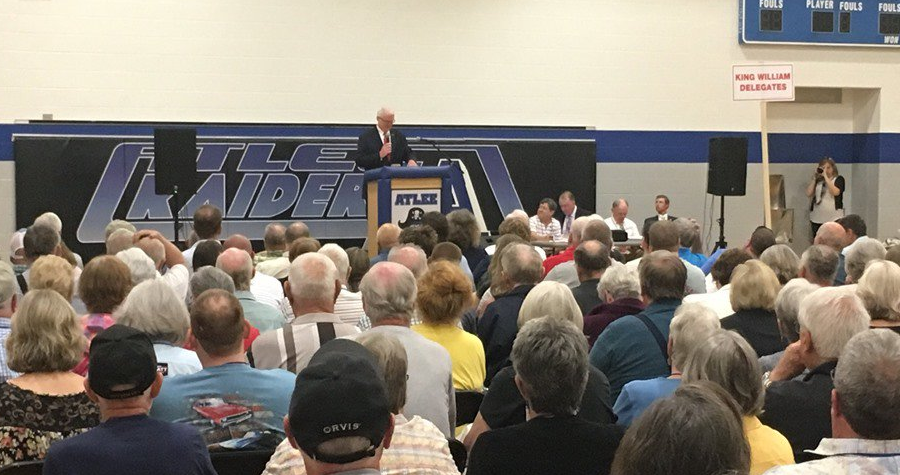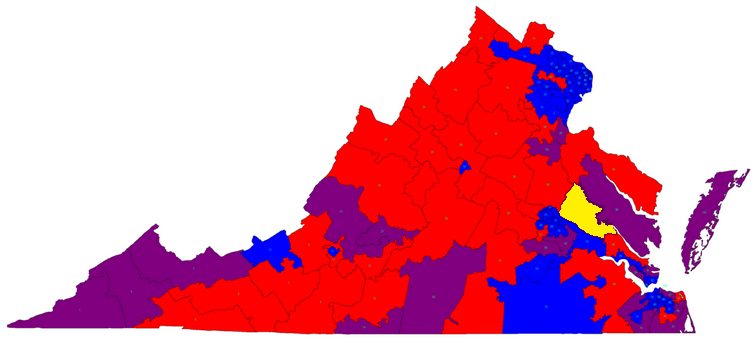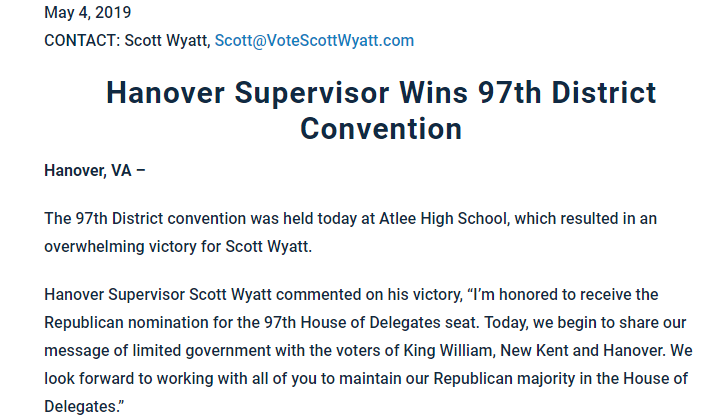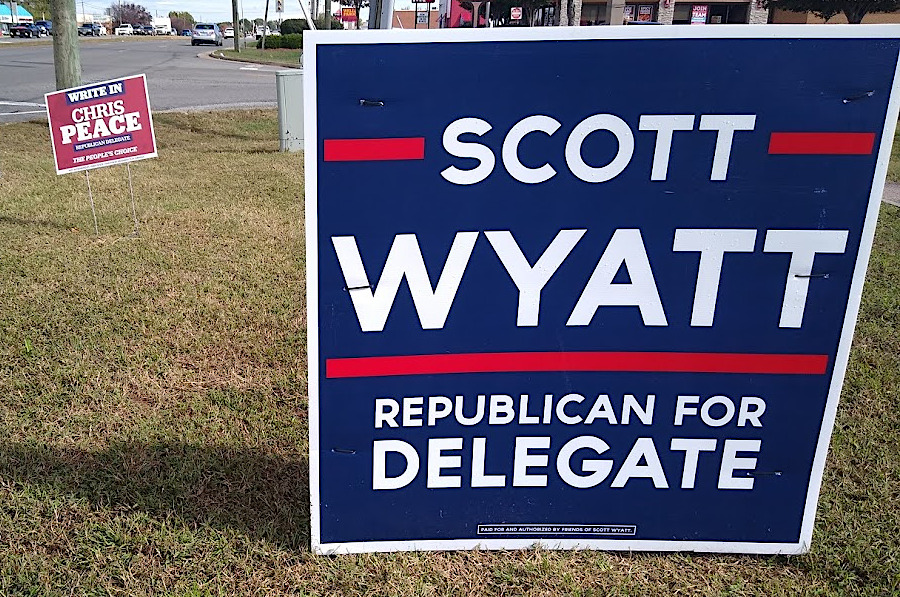
Scott Wyatt was nominated for the 97th District House of Delegates seat in a convention at Atlee High School
Source: Twitter, Paul Middle tweet (May 7, 2019)

Scott Wyatt was nominated for the 97th District House of Delegates seat in a convention at Atlee High School
Source: Twitter, Paul Middle tweet (May 7, 2019)
In the 2019 process to nominate a Republican candidate for the House of Delegates 97th District, the process descended into chaos. A year earlier the Republican incumbent, Del. Chris Peace, had crossed party lines and voted for expansion of Medicaid, which was a priority of the Democratic Party and had been blocked by the Republican majority in the General Assembly.
Members in the House of Delegates serve only a two-year term. Del. Peace's vote to cross party lines spurred a challenger, Scott Wyatt, to seek the 2019 nomination. He received support from the Majority Leader of the State Senate, Sen. Tommy Norment, who was angered at the incumbent's support to implement the Affordable Care Act ("Obamacare") in Virginia.
The 97th House Legislative District Committee of the Republican Party scheduled a convention for May 4, 2019 to choose between the incumbent and the challenger. The party then organized mass meetings in April in New Kent County and parts of King William and Hanover counties, the three local jurisdictions included within the 97th House District. Those meetings elected about 1,700 delegates to attend the convention and choose the nominee for the November, 2019 election.

Del. Chris Peace from the 97th District (yellow), voted for Medicaid expansion in 2018 (purple districts are other Republicans who voted in favor
Source: Bull Elephant blog, Map of Delegates voting for Medicaid Expansion (February 24, 2018)
After the mass meeting in Hanover, it was clear that the challenger would win the nomination at the planned convention. The incumbent's side then orchestrated an effort to cancel the convention and hold a firehouse primary instead. The chair of the Republican Party in Hanover County appointed a new member to the Legislative District Committee. The chair of that committee, a supporter of the challenger, then tried to adjourn a tumultuous meeting without a motion to do so. The other two members met later, and declared that the convention was cancelled. Logistical problems with rental of Hanover High School were used to justify the cancellation.
The area was heavily Republican, so competition occurred in that party's nominating process rather than in the November general elections. Five years earlier, Rep. Eric Cantor was upset in a Republican primary by a poorly-funded "tea party" opponent.
Cantor was House Majority Leader at the time, and expected to become Speaker of the House of Representatives. He blamed his loss later on cross-over votes by Democrats in the open primary, but his loss was due to lower support from Republicans. In 2014, Cantor received 8,500 fewer votes than in the 2012 Republican primary and his opponent won by 7,200 votes, so a claimed surge of additional Democratic voters did not make the difference.

Rep. Cantor claimed that Democrats voting in the 2014 open primary caused his defeat
Source: Washington Post (October 26, 2015)
The "intraparty cannibalism," as one commentator described it, continued into 2019. The power plays and ideological differences were made clear when the chair of the Republican Party of Virginia endorsed the decision to cancel the convention, while the Majority Leader of the State Senate promised whatever financial support would be required for holding it.
The challenger's side went ahead and held the convention anyway on May 4, by renting nearby Atlee High School. The credentials committee certified 486 delegates, with the small number reflecting the decision of Del. Chris Peace's supporters to stay away.
Not surprisingly, the challenger Scott Wyatt was nominated - but the validity of that nomination at the May 4 convention was not clear. The chair of the Republican Party of Virginia told the Virginia Department of Elections that the official nominee would be chosen in a June 1 canvass.1
The Wyatt campaign appealed the decision of the 97th House Legislative District Committee to cancel the May 4 convention, after the mass meetings to choose delegates, to the Republican Party's 1st Congressional District Committee, and hold a firehouse primary. The appeal was successful; the 1st Congressional District Committee overruled the 97th House Legislative District Committee and declared that Wyatt had been nominated.
The attorney for the Wyatt campaign had a convincing argument in the appeal:2

Scott Wyatt defeated a sitting member in the House of Delegates in a contested 2019 nomination process
Source: Scott Wyatt campaign
The Wyatt supporters followed up with a vote to replace the chair of the Republican committee for Hanover County. The county committee then replaced a member of the 97th House Legislative District Committee, giving Wyatt control over party machinery. The 97th House Legislative District Committee then changed its mind and voted to endorse the May 4 convention nomination process in a 2-1 vote.
At the state level, the Republican Party of Virginia withdrew its endorsement of the June 1 firehouse primary several days before it was held. Del. Peace and his supporters still proceeded to vote at the Veterans of Foreign Wars (VFW) building used as the polling place. Peace received 93% of the 2,448 votes cast that day, and claimed he had been nominated as the Republican Party candidate.3
The Virginia State Board of Elections certifies ballots and decides who will appear on them as candidates. It asked the Republican State Central Committee to choose who was the "official" nominee of the Republican Party for the 97th District, and ultimately followed the party's decision.
In a 56-17 vote, the Republican State Central Committee determined the nominee was Scott Wyatt, the nominee who had been chosen through the convention process. Chris Peace considered filing a lawsuit, but ultimately conceded.4
The 2019 race in the 97th District was not the first time that the mechanism of the nomination affected who won, but it was the first time that a political party conducted both a convention and a primary to select a candidate for the same office.5

after a final decision by the Republican State Central Committee, Del. Peace conceded that he had lost the 2019 nomination
Source: Del. Chris Peace, Personal Statement of Delegate Christopher K. Peace on the 97th District Nominating Contest
Supporters of the defeated candidate did not automatically endorse the new Republican nominee. They formed two political action committees (PAC's) that encouraged voters to write in Peace's name on the ballot.
Splitting the Republican vote created the potential for the Democratic nominee to win in the general election. However, the leaders of the PAC's claimed that there were too few Democrats in the 97th district. In 2017, Peace had won in a landslide by 24,363-9,319 votes. Even if Peace won just 49.9% of the Republican vote, the official Republican nominee would still defeat the Democratic candidate.
In the 2019 general election, the official Republican nominee won 56% of the vote. Write-in votes were 18% of the total, reflecting how many supporters of Del. Peace were unwilling to vote for his rival within the party but also unwilling to vote for the Democratic candidate.6

supporters of Rep. Peace sought write-in votes in the general election, after Scott Wyatt was declared the official Republican nominee.